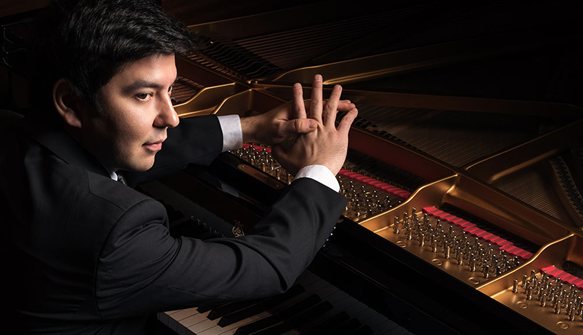
COOL COPLAND, HOT UZBEK PIANIST
Tastes change; once vying with Hanson’s “Romantic” as the most popular American symphony of all, Aaron Copland’s Third showed off its longterm merit and great appeal in the S.F. Symphony’s recording performance this week at Davies Hall.
The Copland is neoclassicism at its best, with recurrent themes, a wide range of sonic colors, and contrasts of deft soft spots with stirring power that was arguably reflecting America, its growth and its optimism. I also detect the hustle and bustle of a metropolis like New York, which had been the composer’s home base when creating this in 1944-46. Copland could appeal to the broad audience as well as to the formalist while creating woodwind chorales and seductive counterpoint.
And then there’s the famous excerpt written before the main work, not after. Copland’s terse American affirmation had been poured into the stentorian brass of his unforgettable “Fanfare for the Common Man,” woven here into the fourth movement—some 15 brass, plus drums. In feeling it’s patriotic enough to make one want to stand, shout hallelujah, salute and run up the flag.
This was however all met in pindrop silence by the cooperating audience at Davies March 15, as the performance was being recorded for future commercial release. With the last notes of the 42-minute opus however they stood and, not saluting, simply cheered one of Michael Tilson Thomas’ most eloquent results with the stellar ensemble. MTT himself appeared delighted beyond words with the performance.
A pianist from exotic Tashkent, Uzbekistan powered the Prokofiev Piano Concerto No. 3 in galvanic fashion. This was Bahzod Abduraimov, 27, winner of the London International Piano Competition nearly a decade ago. He commands incredible bravura pianism, with his fast-flying fingers as blurred as a Siberian blizzard. Indeed, the demanding solo often prevents the soloist from even glancing up at the podium for coordination. Composer Prokofiev, himself a star concert pianist, had unreeled major challenges for soloists following in his path.
Abduraimov showed himself gratifyingly nimble and articulate at the keyboard. The orchestra meanwhile reveled in the lyrical-melodious score, one of the composer’s favorites. If a career can be built solely on sheer virtuosity, this Uzbek artist should do well.
That brings you to the world premiere that night, Charles Wuorinen’s “Sudden Changes.” Wuorinen, 79, is a severe, take-no-prisoners composer, a theoretician whose unabashed atonality can win him some plaudits but no nosegays. (MTT speaks of him as “uncompromising.”)
In the 1950s and ‘60s such challenging music was predominant among the emerging composers, heavily influenced by Arnold Schoenberg, who had developed 12-tone music while reveling in dissonance. The effect on the listener has been compared to taking a bracing cold shower, while tonal composers like Copland, whose lyrical tunes one could hum and replicate, used the hot spigot as well. If you relish musical sighs, rubatos, fermatas and moonlit heartfelt outpourings, you’d go to the latter group.
In Wuorinen’s New York City, analysts spoke of uptown composers like him of an academic bent—think Columbia University, among others—while others (Reich, Thomson, Glass) were dubbed downtown composers—closer to Greenwich Village.
Here Wuorinen used an orchestra with six percussionists no less, building up to mighty brass crescendos and some occasional rhythmic elements suggesting whiffs of jazz. The 15-minute work bristled, but offered some disarmed glissandos here and there. The conclusion featured, after a fortissimo, some receding afterthoughts and a subdued jazz sign-off chord. Orienting the applause, MTT acknowledged his longtime collaborator sitting in the left-front artists’ box.
Some dissection of the music in the printed program would have helped. In a short essay, where the 1st person pronoun was used 11 times in 15 lines, the sole clue was that here Wuorinen used some fragments from an earlier opera, “Haroun and the Sea of Stories.”
S.F. Symphony under MTT playing Wuorinen (new), Prokofiev and Copland, March 15-17 at Davies Hall, San Francisco. For SFS info: (415) 864-6000, or go online.